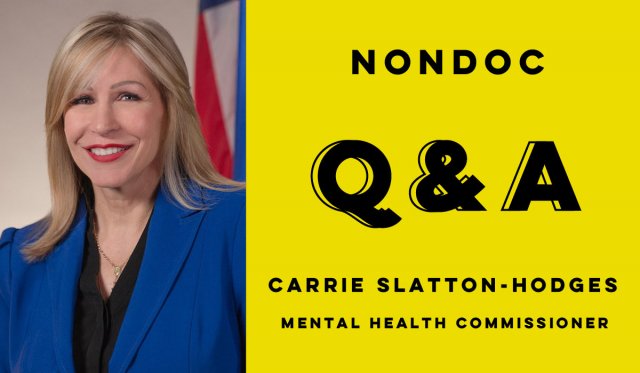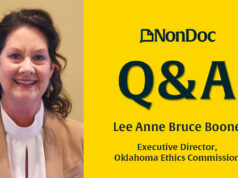
Carrie Slatton-Hodges became the interim commissioner of the Oklahoma Department of Mental Health and Substance Abuse Services in January, following the departure of Terri White, who had been in the post since 2007.
Slatton-Hodges had served as White’s deputy commissioner for 12 years before stepping into the top job. She has been a licensed professional counselor for 29 years, with a career that has taken her through a wide range of settings and roles.
NonDoc recently asked the interim commissioner some questions to help Oklahomans get to know her and hear about her plans for the department. The following interview has been edited lightly for style.
Tell us a little about yourself. Where did you grow up and how did you get into the mental health field?
I grew up in OKC from the age of 13 on. I’m a Putnam City North Panther. I moved to a farm in western Oklahoma, just east of Bessie on the Washita River, as a young adult and completed my graduate work at Southwestern Oklahoma State University, in Weatherford, while raising angora goats and alfalfa.
I started my work in mental health in a rural setting covering eight counties and have provided, developed and supervised most any type of behavioral health program you can think of. I’ve always loved to build programs and budgets and collect data to analyze what works and what does not.
I think I was born a counselor by nature, and I was raised by very intelligent parents who also strongly believe in giving back to society and to those less fortunate. One of the best things in life is to see someone go from being very ill and to be around to see them at their best. I’ve had a lot of that luxury in my life.
What problems are caused by stigma associated with mental health care, and what can be done to decrease stigma?
Stigma has a long and complicated history and, believe it or not, it is much better today than it was in the past. I think the most important thing to fight stigma is for persons to be open about their life experiences, the symptoms they have had or the addictions they have battled so that people realize these diseases and symptoms are much more prevalent than many think.
At one point, I was on call for crisis evaluations from 5 p.m. until 8 a.m. for a year in western Oklahoma, and let me tell you, these diseases don’t discriminate. I’ve seen persons from every walk of life be brought to their knees by anxiety, depression, addictions and psychosis. I’ve also seen them get back up off their knees with help and support and to go on to live full and healthy lives.
What is the biggest challenge facing ODMHSAS right now? And what are your personal priorities for the department?
Honestly, I don’t really see challenges, just opportunities. We have many opportunities in front of us. We need to continue to develop our statewide crisis system to layer in more technology, mobile crisis response, additional urgent care centers, and to work more closely with law enforcement dispatch. We need to continue to develop and partner on diversion from the criminal justice system for those with mental health and addiction issues, and we need to continue to improve access to care at all levels.
You have been with the department for more than 14 years already, but what have you learned during your first six months as commissioner?
That there are so many persons who care about these issues, many through life experience or family experience, who are willing and able to partner to continue developing and growing the best services and supports.
Last year, Oklahoma won hundreds of millions of dollars from drug companies to fight opioid addiction. What impact do you foresee those judgments and settlements having on the opioid epidemic in the state?
Our state has done an amazing job in addressing the opiate epidemic and has been one of the few states to see a major reduction in overdoses deaths, thanks to partnerships both public and private.
Physicians are checking the Prescription Monitoring Program to ensure persons are not already receiving opiates before prescribing. We’ve also seen a greater utilization of alternatives for pain management, and treatment for opiate addiction is readily available.
That said, much of that work has been completed with the assistance of federal dollars. In order to keep access to care in the future, these judgment and settlement funds will be crucial to not go backward in this fight.
If you had to appear as a guest on the show America’s Got Talent, what talent would you perform?
I would probably have my dogs, Teddy Bear and Kaiser, perform tricks for you. My cat, not so much.





















